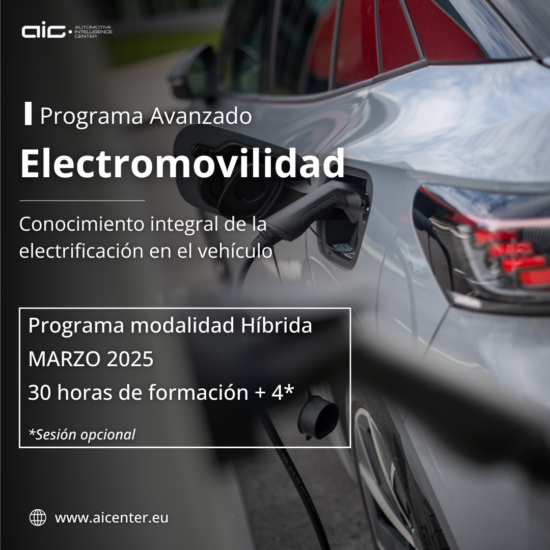
Program taught by our partner AIC – Automotive Intelligence Center
The electrification of vehicles is an unstoppable process that needs to be understood and managed, as we are experiencing a significant increase in the number of models on our roads. For this reason, AIC is launching the 4th edition of the Advanced Electromobility Program which aims to provide in a systematic and practical way, the keys to understand the electrified vehicle, the implications in each function of the vehicle and how to integrate it into the activity of each company. This pioneering program is especially designed for companies that manufacture components for electrified vehicles but want to understand the full implications for the whole vehicle and its manufacturing.
On this occasion, as a novelty, a HYDROGEN module will be added. In addition, participants will be able to benefit from a special BENCHMARK BYD SEAL experience.
Online: March, 6th and 7th, 2025
On-site: March, 11th, 12th and 13th, 2025
DURATION: 30 hours + 4*
* On-site session (optional) (Hydrogen)
To facilitate the comprehensive knowledge of vehicle electrification to companies that are working in the manufacture of components for this market segment
Professionals who are specializing in different areas of electrification.
Introduction and basics of H&EV´s – online – Day 1: from 09.30h to 12.30h
- Overview of the automotive sector
- Factors for the introduction of H&EVs in the market
- Barriers for the entry of H&EVs
- Current market situation
- Future trends
Powertrain in the H&EV’s – online – Day 2: from 09.30h to 12.30h
- H&EV Conceptualization
- H&EV Typology
- Alternative propulsion architectures
- Powertrain characterization variables
- Driving cycles: WLTP
- Impact of electrification
Electric engines – on-site – Day 3: from 09.00h to 13.00h
- General Concepts
- Types of engines
- Electric engine design parameters
- Selection of basic electric engine specifications
- Controller (Driver)
Kinematic characterization of the Powertrain – on-site – Day 3: fro 14.00h to 16.00h
- Description of powertrain components
- Sizing of powertrain components
- Study of vehicle performance
- Electric vehicle driving characteristics
Electronics and Control Systems – on-site – Day 3: from 16.00h to 18.00h
- Main elements in ECUs
- Communication between ECUs (CAN, Ethernet…)
- ECU software
- Programming languages
- Types of ECUs
Energy storage systems (vehicle) – on-site – Day 4: from 09.00h to 13.00h
- Battery Fundamentals
- Battery Design Considerations
- Battery electrochemistry
- Current status of lithium-ion battery development
- Storage system management and control mechanisms (BMS)
- Battery sizing and packaging
Vehicle Charging (infrastructure) – on-site – Day 4: from 14.00h to 18.ooh
- Charging system
- Charging modes ( depending on communication)
- Charging types ( depending on connector)
- Dimensioning of the charging system depending on Powertrain characteristics
Integration in vehicle – on-site – Day 5: from 09.00h to 13.00h
- Component Certification (ECE R100)
- Electromagnetic compatibility
- NVH (Noise, vibration and harshness) requirements
- Electrical Powertrain calibration, validation and tuning
- Vehicle dynamics
Electric vehicle safety – on-site – Day 5: from 14.00h to 18.00h
- Physiological effects of electrical current on the human body
- Personal Protective Equipment
- Safety protocol for working on an EV
- Maintenance of the electric drivetrain system
- Repairing an EV
- EV diagnostics
Hydrogen – Optional Module – Day 6: March 14th – 9.00h-13.00h
- Introduction to the technology
- Hydrogen
- Fuel Cells
- Hydrogen Engines
- Storage
- Hydrogen in mobility
- Automotive
- Heavy Vehicles
- Other Land Vehicles (Forklifts, etc.)
- Vehicle architecture
- Systems
- Subsystems and Equipment
- Power System Operation

